
REO Speedwagon, or simply REO, is an American rock band from Champaign, Illinois. Formed in 1967, the band cultivated a following during the 1970s and achieved significant commercial success throughout the 1980s. Its best-selling album, Hi Infidelity (1980), contained four US Top 40 hits and sold more than ten million copies.

Hi Infidelity is the ninth studio album by American rock band REO Speedwagon, released on November 21, 1980, by Epic Records. The album became a big hit in the United States, peaking at number one on the Billboard 200. It went on to become the biggest-selling album of 1981, eventually being certified 10 times platinum by the Recording Industry Association of America. Of the four singles released, "Take It on the Run" went to number 5 on the Billboard Hot 100, and the band got their first of two number one hits with "Keep On Loving You".

The Ballads is a 1999 compilation album by REO Speedwagon. It features some of the band's previously recorded hit ballads as well as two additional songs, Just For You and Til The Rivers Run Dry.

The Earth, a Small Man, His Dog and a Chicken is the thirteenth studio album by REO Speedwagon, and was released in 1990.
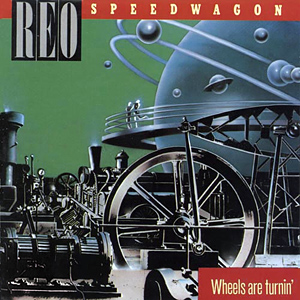
Wheels Are Turnin' is the eleventh studio album by REO Speedwagon, released in November 1984. It reached No. 7 on the Billboard 200. The lead single was "I Do' Wanna Know," which stalled at #29 on the Billboard Hot 100. The second single, "Can't Fight This Feeling," was REO's second and longest-running number one single. Other singles released were "One Lonely Night" and "Live Every Moment". These singles also reached the Top 40 of the Billboard Hot 100, reaching #19 and #34, respectively. The singles from the album also had success on other Billboard charts: "Can't Fight This Feeling" and "I Do' Wanna Know" each reached #5 on the Mainstream Rock chart, with "One Lonely Night" reaching #17, and "Can't Fight This Feeling" and "One Lonely Night" reached #3 and #10, respectively on the Adult Contemporary chart.
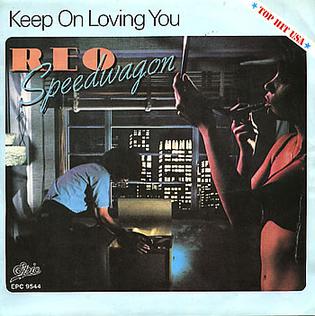
"Keep On Loving You" is a rock ballad written by Kevin Cronin and performed by American rock band REO Speedwagon. It features the lead guitar work of Gary Richrath. The song first appeared on REO Speedwagon's 1980 album Hi Infidelity. It was the first REO Speedwagon single to break the top 50 on the U.S. Billboard Hot 100, reaching the number-one spot for one week in March 1981. The single was certified platinum for U.S. sales of over one million copies. It peaked at number seven on the UK Singles Chart. "Keep On Loving You" has been a mainstay on 1980s soft rock compilations and has appeared on dozens of 'various artists' compilation albums, as well as several REO Speedwagon greatest hits albums.
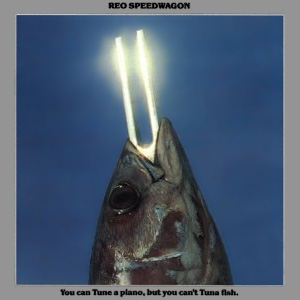
You Can Tune a Piano, but You Can't Tuna Fish is the seventh studio album by REO Speedwagon, released in 1978. It was their first album to be co-produced by lead singer Kevin Cronin and lead guitarist Gary Richrath. The album was REO's first to make the Top 40, peaking at No. 29. The album sold over 2 million copies in the US, which led it to being certified 2× Platinum.

"Take It on the Run" is a song by American rock band REO Speedwagon off the band's ninth studio album Hi Infidelity (1980). The song was written by lead guitarist Gary Richrath. "Take It on the Run" was the follow-up single behind the group's number-one hit, "Keep on Loving You". The single went gold on April 17, 1989. "Take It on the Run" has appeared on dozens of "various artists" compilation albums, as well as several REO Speedwagon greatest-hits albums. The 2017 song "Messin' Around" by Pitbull featuring Enrique Iglesias interpolates "Take It on the Run".
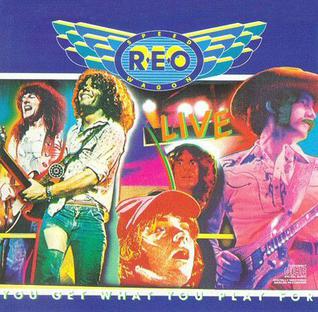
Live: You Get What You Play For is a live album by rock band REO Speedwagon, released as a double-LP in 1977. It was recorded at Soldiers and Sailors Memorial Building in Kansas City, Kansas, the Convention Center in Indianapolis, Indiana, Kiel Auditorium in Saint Louis, Missouri and Alex Cooley's Electric Ballroom in Atlanta, Georgia. It peaked at number #72 on the Billboard 200 chart in 1977. The song "Ridin' the Storm Out" reached #94 on Billboard's Hot 100 chart, but has since become a classic rock radio staple. The album went platinum on December 14, 1978.

Gary Dean Richrath was an American guitarist, best known as the lead guitarist and a songwriter for the band REO Speedwagon from 1970 until 1989.
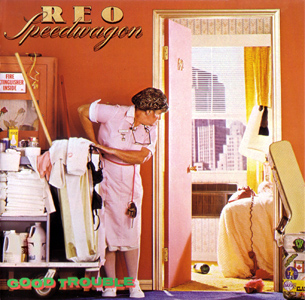
Good Trouble is the tenth studio album by REO Speedwagon, released in 1982 as a follow-up to Hi Infidelity. It peaked at #7 on the Billboard charts. The single "Keep the Fire Burnin'" gave the band a #7 hit on Billboard's Pop Singles Chart and a #2 hit on the Mainstream Rock Tracks chart, their highest-charting hit on this chart.

R.E.O. Speedwagon is the debut studio album by American rock band REO Speedwagon. Released in 1971, it was the only album recorded with singer Terry Luttrell, who would go on to join Starcastle. Kevin Cronin joined the band for R.E.O./T.W.O. This album concluded with a progressive rock song unlike the later arena rock songs that made them famous.

Nine Lives is the eighth studio album by REO Speedwagon. It peaked at number #33 on the Billboard 200 chart in 1979. The album went gold on December 5, 1979. The title Nine Lives was chosen because the album was the band's ninth, including their live album, and it also featured nine songs. It was the last REO album to prominently feature a more hard rock sound. The group would turn to more pop-oriented material with 1980's Hi Infidelity. In 2013, the album was released on CD by UK-based company Rock Candy Records, with expanded liner notes and photos.

R.E.O. is the sixth studio album by REO Speedwagon, released in 1976. It peaked at number 159 on the Billboard 200 chart in 1976. It marked the return of Kevin Cronin to the band after a four-year absence. Five of the songs were featured on the band's subsequent live album, Live: You Get What You Play For. Many fans refer to the album as C.O.W. due to the background of the cover art.
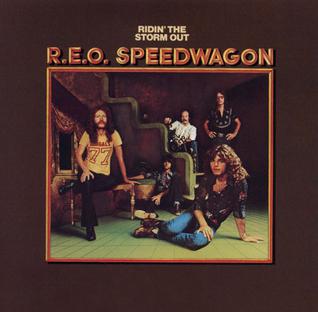
Ridin' the Storm Out is the third studio album by REO Speedwagon, released in 1973. It peaked at number 171 on the Billboard 200 chart in 1981, and reached platinum status in 1989. It was the first album to feature Mike Murphy on vocals. The sessions started out with Kevin Cronin, but he left the band before the album was finished, due to creative differences. The title track would later become a hit for the band on their live album, after Cronin had returned to the band. The song refers to the band being stuck in a harsh winter blizzard after a show in Boulder, Colorado, at a bar named Tulagi.
"157 Riverside Avenue" is a song by REO Speedwagon from their first album, REO Speedwagon, released in 1971. It was written by all five band members at the time, Terry Luttrell, Gary Richrath, Gregg Philbin, Neal Doughty, and Alan Gratzer. The title refers to the Westport, Connecticut address where the band stayed while recording that album. On March 29, 2012 the house the band stayed in was torn down to make way for a new house.
Terry Luttrell is an American rock singer/musician best known as lead vocalist for both REO Speedwagon (1968–1972) and Starcastle (1973–1979).

Life as We Know It is the twelfth studio album by REO Speedwagon, released in 1987.
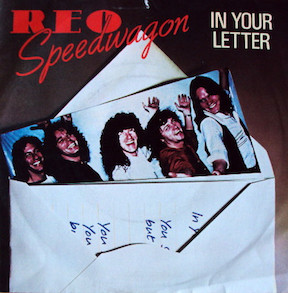
"In Your Letter" is a song written by Gary Richrath that was first released on REO Speedwagon's 1980 album Hi Infidelity. It was released as the fourth single from the album and just made the Top 20 on the Billboard Hot 100 chart, peaking at #20. It also reached #26 on the Billboard Adult Contemporary chart. It also had some chart success in Canada, reaching #34.

"I Do' Wanna Know" is a song written by Kevin Cronin that was the lead single from REO Speedwagon's 1984 album Wheels Are Turnin'. It was more of a rocker reminiscent of the songs REO Speedwagon had released in the 1970s than the ballads the band had been successful with in the early 1980s. It had limited success on popular music charts, which was blamed for delaying sales of the album until the release of the follow-up single, the ballad "Can't Fight This Feeling." The video to the song was nominated for several awards.

















